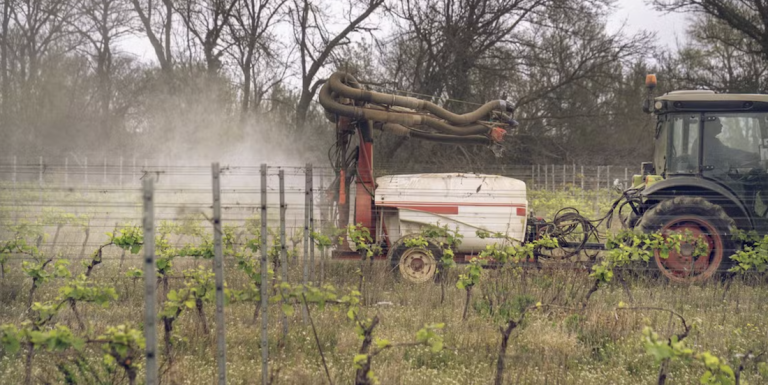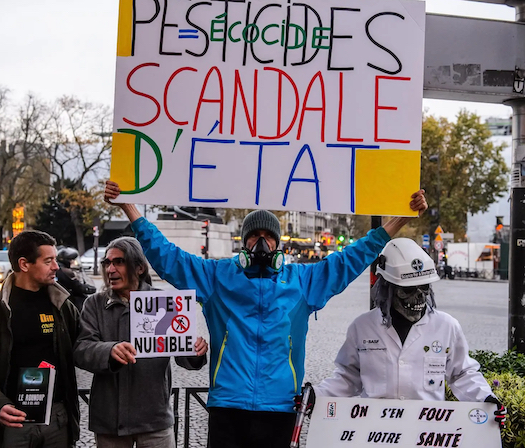
Over one million people sign petition urging French government to reverse law allowing pesticide banned for its harmful effects on bees
New York, N.Y. – A massive public outcry in France has seen over one million people sign a petition urging the government to reverse a controversial law allowing the reintroduction of acetamiprid, a pesticide banned since 2018 for its harmful effects on bees and other pollinators.
According to Le Monde, the petition, launched by a 23-year-old master’s student has broken records by surpassing the 500,000-signature threshold required to trigger a parliamentary debate, reaching over 1.2 million signatures by July 21, 2025. The so-called “Duplomb law,” passed on July 8, 2025, but not yet enacted, has sparked widespread anger for prioritizing agricultural interests over biodiversity and ecosystem health.
Petition Ignites National Debate

The “No to the Duplomb law” petition has become a rallying cry for environmentalists, beekeepers, and concerned citizens across France.
Le Monde reports that the campaign, hosted on the French government’s online platform, gained traction with support from groups like Greenpeace France and Pollinis, a nonprofit focused on protecting pollinators.
The petition’s creator told Le Monde, “This law is a step backward for our planet. Bees are vital to our food system, and we cannot sacrifice them for short-term gains.”
The petition’s rapid success underscores growing public awareness of the critical role pollinators play in maintaining food security and ecosystems.
The Duplomb law, named after its proponent, Senator Pierre Duplomb, seeks to reinstate acetamiprid, a neonicotinoid pesticide, for use on certain crops.
Neonicotinoids, known for their systemic effects on plants, are absorbed by crops and can contaminate pollen and nectar, posing lethal risks to bees.
The original ban in 2018 was hailed as a victory for environmental advocates, aligning France with European Union regulations prioritizing biodiversity. The proposed reversal has drawn criticism from scientists and activists, who argue it undermines years of progress in protecting pollinators.
Environmental and Economic Stakes
The controversy surrounding the Duplomb law reflects a broader tension between agricultural productivity and environmental sustainability.

Le Monde notes that proponents of the law, including some farming organizations, claim that acetamiprid is essential for protecting crops like sugar beets from pests, thereby safeguarding food security and farmers’ livelihoods.
However, critics counter that the pesticide’s reintroduction could devastate bee populations, which pollinate roughly one-third of global food crops, according to the U.N. Food and Agriculture Organization.
A decline in pollinators could disrupt ecosystems and lead to significant economic losses in agriculture.
“This is not just about bees; it’s about the future of our food,” said Marie-Claire Fournier, a beekeeper quoted by Le Monde. “Without pollinators, entire supply chains collapse.”
The petition has galvanized support from urban and rural communities alike, with many signatories expressing frustration over the government’s apparent prioritization of industry over environmental health.
Political and Social Response
The petition’s success has put pressure on French lawmakers, with opposition parties calling for a reevaluation of the Duplomb law. Le Monde reports that the Green Party and other left-leaning groups have seized on the issue to criticize the government’s environmental record.
“The million signatures show the people’s will is clear,” said Green Party spokesperson Julien Moreau. “We demand a vote to repeal this dangerous law.” The petition’s milestone ensures it will be debated in the French National Assembly, though the outcome remains uncertain.
Social media has amplified the campaign, with hashtag #SaveTheBees
trending across France. Activists have organized protests in Paris
and other cities, urging the government to uphold the 2018 ban.
The movement has also drawn international attention, with environmental groups in the U.S. and European Union expressing solidarity.
Global Implications for Pollinator Protection
The French petition resonates beyond national borders, highlighting the global challenge of balancing agricultural needs with biodiversity conservation. Le Monde cites experts who warn that reintroducing neonicotinoids could set a precedent for other countries to weaken their own pesticide regulations.
The European Union, which banned neonicotinoids in 2018, is closely watching France’s next steps. “This is a test case for whether we prioritize short-term profits or long-term sustainability,” said Dr. Sophie Laurent, an entomologist quoted by Le Monde.
The petition’s momentum suggests that public opinion may force a reckoning on pesticide use worldwide. As climate change and habitat loss further threaten pollinators, grassroots movements like this one could shape future environmental policies.
#SaveTheBees #NoDuplombLaw #ProtectPollinators #Biodiversity #FranceEnvironment
Tags: French petition, bee-killing pesticide, acetamiprid, Duplomb law, pollinators,
biodiversity, food security, environmental activism, France, neonicotinoids
